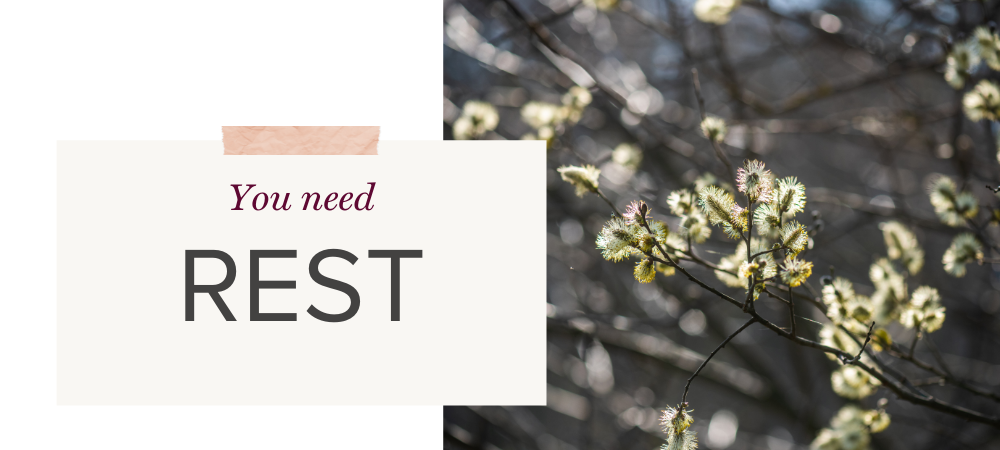
You have all of the permission you need right now to rest.
You have permission to rest, even if that feels impossible. You have permission to rest even if you don’t, yet, know how to rest. You only need to peek outside of your door to see that rest is a necessary part of the cycle of life taking place in the natural world around you. You have permission to rest the same way morning glories close at dusk. The same way the tide ebbs and flows. The same way bears hibernate in winter. Tending to your need for rest is not a sign of weakness. It is how you lovingly care for your own weariness, patching yourself up where you have worn thin. You have permission to care for yourself in this way. You have permission to slow down and proceed in your own right timing. This rest is yours for the taking.
Rest is any activity that fills your cup or restores your energy. Protecting and maintaining your energy is necessary because it determines your internal capacity for everything that you want to make happen in your life -- including tending to yourself, your work, relationships, taking care of your children, working on that project you’ve been wanting to start. It is seductive to put off meeting your need for rest until you’ve worked your way to the very bottom of your constantly regenerating to-do list, but it is necessary to begin prioritizing rest before you can begin tending to yourself in other, more delicious, and dynamic ways. Caring for yourself requires energy, which, no doubt, is one of the reasons you have resisted it for so long. You might ache for care because you are exhausted but you don’t have the energy to care for yourself, and that cycle keeps repeating as you fall deeper into a state of burnout. Paradoxically, front-loading rest will grant you more energy to use each day.
Merriam-Webster defines rest as “to stop doing work or an activity: to spend time relaxing, sleeping, or doing nothing after you have been active or doing work.” This definition is problematic in that it specifically marries deserving rest with completing hard work, further compounding our belief that we do not deserve the rest we ache for unless we earn it.
For our purposes, I will expand on this definition of rest to include: “Participating in activities that give you more energy than they require to accomplish, including but not limited to sleep.” All non-sleep rest activities will require energy to accomplish, but this expanded definition takes into account these activities that give you more energy than the energetic expenditure that the activity requires. Taking this equation into account, all of us will have different restful activities because as unique individuals with unique capacities, our personal equation of energy used versus energy gained will differ.
Restful activities might be something as simple as taking a couple of deep breaths while you wash your hands in the bathroom multiple times a day. That kind of habit is particularly effective because it enables you to attach a restful activity (breathing) to something that you already do (washing your hands). You could choose to commute to work in silence or listen to something nourishing. You might read a book for 10 minutes instead of scrolling on your phone in the morning. Or spend time at the beginning and end of the day watering your garden.
These activities incorporate moments of reprieve into your daily life instead of pushing rest to the bottom of your list after everything is done, which is to say, never. If you’re not being attentive to your needs as you move throughout the day, you are setting yourself up to be overwhelmed by them when you finish work. It is no surprise that you feel like an overflowing bucket of neediness after you’ve gone through your day without thinking about your body or taking time for yourself. Trying to avoid this messy bucket of needs is one of the many reasons we over-work ourselves. We don’t want to stop because we are afraid of what will happen when we do.

Books
- Radiant Rest: Yoga Nidra for Deep Relaxation and Awakened Clarity by Tracee Stanley
- Sacred Rest: Recover Your Life, Renew Your Energy, Restore Your Sanity by Dr. Saundra Dalton-Smith
- Set Boundaries, Find Peace: A Guide to Reclaiming Yourself by Nedra Glover Tawwab
Practices
Boundaries with YOURSELF regarding your bedtime.
It can be tempting to push your bedtime later and later each night, particularly when your day is full of work, caring for children, or putting everyone else’s needs first. It can be tempting to want to hoard this “me time” or continue to attempt to be productive far after everyone else has gone to bed.
Hear me when I tell you that n-o-t-h-i-n-g in your life works if you are not in good working order, and this includes being well-rested. Rest enhances your energetic capacity and resiliency in ways that are categorically impossible to replicate, no matter how many cups of coffee you drink or how robust your productivity hacks are.
Experiment with giving yourself a bedtime. This doesn’t have to be a harsh realignment. If you’ve been going to bed late, start by adjusting your bedtime earlier in 15-20 minute intervals. Pledge to turn the tv off or stop cleaning the kitchen at least 30 minutes before your bedtime. Brush your teeth. Wash your face. Put on cozy pajamas. Climb into bed.
Remind yourself how good it feels to be well-rested.
Sensory rest.
You are navigating a profound amount of sensory input on a daily basis -- the sounds, smells, visual stimuli, tastes, and physical sensations that fill your waking hours to the brim. Giving yourself the gift of sensory rest can be an intentional way to braid more rest INTO your daily life, instead of thinking of rest as a horizontal activity (that you certainly don’t have time for). Dr. Saundra Dalton-Smith defines sensory rest as “the opportunity to downgrade the endless onslaught of sensory input received from electronics, fragrances, and background noise.”
You could get this rest by closing yourself in the bathroom, turning off the light, and covering your ears for a couple of minutes. You might choose to lie down with a lavender pillow or t-shirt over your eyes for a few minutes. You might choose to drive in silence instead of listening to the news. Or, bathe in the dark to rest your eyes. It doesn’t take a long time to benefit from the quiet, sensory solitude of employing this type of rest over the course of the day.
Technology use & the power of unplugging.
Too often we prioritize connecting with others through our technology over connecting with ourselves, only to realize that scrolllllllllling through social media (again) doesn’t actually make us feel all that connected. Or, maybe it does, but we notice ourselves scrolling when we’d like to be resting or nourishing ourselves in other ways.
Experiment with creating some boundaries with your technology use as another way to provide yourself with rest from visual stimuli and other people’s opinions. These boundaries might include social media, email, the news, online gaming, or anything else that you notice you could benefit from a break from!
Two ways that I like to play with this boundary is to put my phone on airplane mode from 8 pm to 8 am each day, guaranteeing myself 12 hours a day where I get to be alone in my head, or deleting my social media apps every other weekend for a weekend of play and peace.
Share your results!
If there is one thing I know, it's that permission loves company. Click here for swipe copy and beautiful images to share this needs quiz with your loved ones. Thank you for your interest in sharing my work. xx
Love these results? Want more?
Sign-up here to receive access to the secret Well Tended podcast episode about meeting your need for rest and a delicious resource to help you support yourself as your needs shift. This resource includes all five need results, my favorite book recommendations, and a slew of fabulous practices you have you tending to your needs in no time.